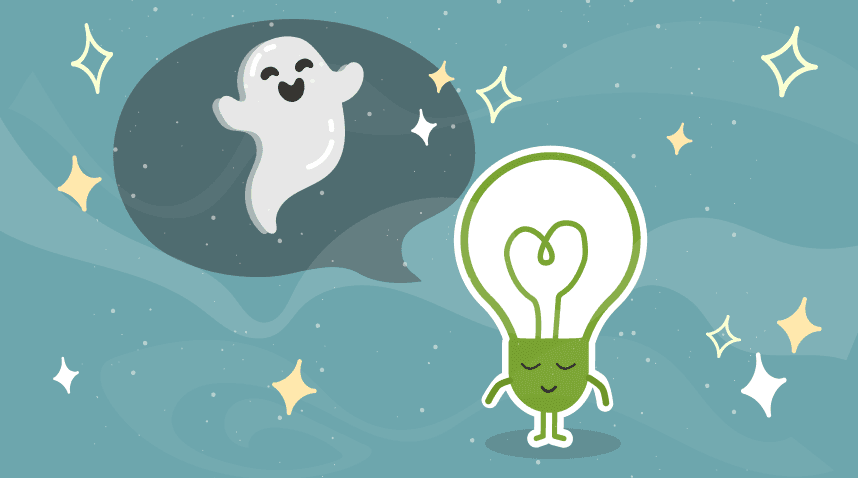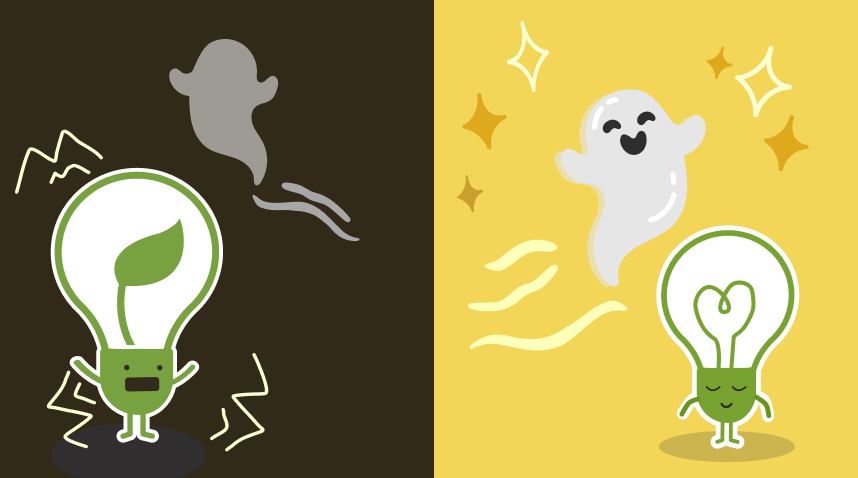TLDR: What story do we tell ourselves when we hear the word ‘ghost’? Can we tell a new more familiar story about death and ghosts?
Some of us may have negative connotations toward death and ghosts. This is often exacerbated by stories we’ve been told as a child or perceptions formed from various media portrayals of the topics (mostly horror movies).
Growing up, I had this image stuck in mind: ghosts are (normally female) floating figures with scary faces, coming out of dark corners to disturb me. It never crossed my mind if they could look any different or what were the reasons they wanted to ‘disturb’ me.
This image was such an impersonal one. And because I did not have encounters with these unseen beings, that view stayed on.
What does ‘death’ actually mean?

Talking about ghosts seems incomplete without first talking about death. My first-hand experience with death as an adult did not happen until I was in my 20s, when my grandmother passed away. Sure, I had experienced other grandparents’ passing during childhood. Having the mind of a young child back then, I doubt I understood what death truly meant. Plus, I was not as close to the other grandparents as to this grandmother.
I recall receiving a Whatsapp text from a cousin almost a decade ago, telling me that Grandma had passed on. I was already working in Singapore then and I had just visited her when she was hospitalized in Singapore not long before that. In the ward, she looked like a frail old woman.
Nevertheless, the text still caught me off-guard, considering she was discharged and flew home after recovering from her ailments. My first reaction was anger. Why was I not informed when she was unwell and hospitalized again back home? What followed next was the anxiety of looking for a flight home the following day after settling some work.
After what felt like a long journey (it was only an hour flight!), I reached the funeral home at night. Walking towards the coffin and seeing Grandma’s body in the wooden box – confusion, longing and regret arose within me. She was one of the closest people to my heart and I had missed my chance to say goodbye.
The next few days until her burial felt like roller-coaster rides that kept falling steeper and deeper. The emotions from the first day stayed alongside numbness. Strangely, there were no wailing cries nor any loud emotional expressions from me. I grieved in privacy. Perhaps, I didn’t know how to grieve then.
The day of burial felt like a systematic procedure to me – her photo was the only thing relating me to her. Reaching her home after the funeral procession, I sat in her living room and started to look at the place with different eyes. It’s a familiar yet foreign place.
The realisation dawned on me: this person is not around anymore in this physical world. At the same time, I can still sense her presence in familiar places and even in new places today, whenever I think of her occasionally.
Her ghost

The thought that I might encounter Grandma’s ghost came afterwards, after hearing many stories of friends and family meeting with their loved ones’ spirits in dreams. I was secretly hoping that she would drop by in my dreams to say goodbye. It has not happened until this day.
Being able to consciously review my experience in the death of a loved one, has made me rethink how I view ghosts in general. The feeling of fear is now accompanied by, if not replaced with, kinship. I can now see these beings as those who have lived and had human experiences.
Every time I return home, I make sure to visit the columbarium where Grandma’s ashes are kept, just to have a ‘conversation’ with her, albeit one-sided.
How are you doing?
Do you watch us from there?
I’ve brought some flowers today. Do you like them?
During tomb-sweeping or other festive periods, my prayers are mostly ‘for her’ instead of ‘to her’. She’s one of the people I wish well when meditating, and after learning about merits-sharing when I learnt more about the Dhamma.
May you be well, at ease and at peace.
I hope you’re in a better realm now.
The mind state helps to expand the range of my well wishes to wider universal beings, going beyond just people that I know and love. Just recently I was introduced to Karaniya Metta Sutta that puts this intention into words quite aptly:
Wishing: In gladness and in safety,
May all beings be at ease.
Whatever living beings there may be;
Whether they are weak or strong, omitting none,
The great or the mighty, medium, short or small,
The seen and the unseen,
Those living near and far away,
Those born and to-be-born —
May all beings be at ease!
…..
Radiating kindness over the entire world:
Spreading upwards to the skies,
And downwards to the depths;
Outwards and unbounded,
Freed from hatred and ill-will.
Reading the discourse Tirokuṭṭapetavatthu Pv 5, I am comforted that my grandmother may receive what I share. Even though she may have been reborn, it does not erase the relationship we have had in this lifetime. I feel joyful every time I think of our times together. The possibility of collecting good merits from these generous acts adds to the wholesome mindstate of my practice 😊
Wise points:
- The mind tends to amplify (negative) stories we hear in our head, especially on intangible topics like ghosts or spirits.
- We can tell a more personalised story about death and ghosts to help us see these topics as a live experience, rather than mystical narratives.
- Sharing positive thoughts and merits with our departed loved ones does not only bring joy and peace into mind but can also benefit our loved ones greatly.


